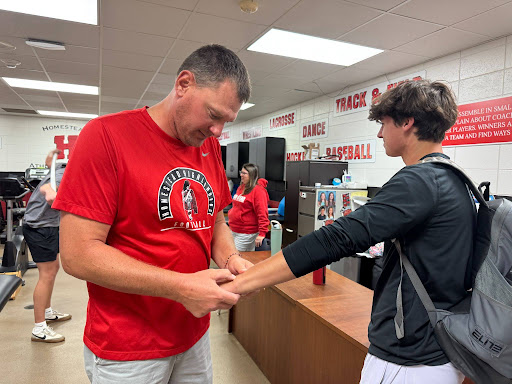Through the eyes of a former addict
Will Slawson, junior, plays a song on the bass. Slawson has played the bass for many years and it is one of the ways he copes with the adversity he has faced. “This was an activity I enjoyed prior to my illness and the people I met at treatment reintroduced me to it. I really liked it so I’ve kept with it ever since,” he said.
It’s a normal day in the Slawson household.
The phone rings.
Mrs. Nancy Slawson picks up the phone.
She is informed that her son, Will Slawson, junior, needs to stop working out immediately.
After a routine checkup at the doctor, her son, Will’s results were not looking as healthy as usual. He appeared to have low blood pressure, a low heart rate and had lost a significant amount of weight since his last check up. Unfortunately, this was only the beginning.
Slawson, who has played football since fifth grade and ran track ever since his eighth grade, began to increase the amount of time he spent working out significantly after his freshman year of football.
“The more I worked out, the more I felt like I had to do it to keep up. If I did a certain amount of sets one day, the next day I would never let myself do less. I would always do the same amount or more,” Slawson said.
Even though it started out solely as strength training for football and track, the more Slawson worked out, the more he began to do it for his image.
Due to overworking himself, exercising began to take a toll on Slawson’s body.
“The first things I noticed were that I was completely fatigued and cold all the time. It was literally summer and I would be wearing sweatpants and a sweatshirt daily because of the lack of nutrition my body was receiving,” Slawson said.
In addition to the physical aspects, damage had been done to Slawson’s organs, specifically his heart.
Frustrated and in denial, Slawson began to believe the doctors were taking away his life. He was no longer permitted to work out and was admitted to the hospital for about a week in order for his system to be rejuvenated.
A month or so after he returned home from the hospital, Slawson did not feel the same as he did prior to being treated. “Everything I used to be I realized I really wasn’t anymore. I was much less social, less nice and more of an angry, sad person,” he said.
Due to what Slawson felt was a change in identity, his parents decided treatment was the best option in order to get him the help he needed.
On Sept. 14, 2015, Slawson was admitted to the inpatient eating disorder unit at Rogers in Oconomowoc. Slawson went back and forth between different units within the hospital until he finally returned home on Aug. 10, 2016.
“I physically recovered after a couple months at Rogers, but I didn’t mentally recover until I neared the end of my stay there,” Slawson said.
As a result of the adversity Slawson faced, he is not allowed to play football his junior year of high school and works out in moderation with a personal trainer.
“The most difficult part about what I had to go through was losing so much time from my life where I could have been doing so much to better myself for the future ahead of me. I fell behind and now I’m trying to focus on getting back into everything one step at a time,” Slawson said.
Although treatment was a tough milestone in his life, Slawson believes the experience has made him wiser.
Currently, Slawson is writing a book about his journey and plays the bass to keep himself focused on staying better.
“I now know how powerful people and the things around you can impact you in your life,” Slawson said.

Kate Price is a junior and this is her first year apart of the advanced publications staff. Kate is a major coffee lover and spends the majority of her...












Angie Cicero • Sep 30, 2016 at 5:41 pm
Wonderful story! Thanks for sharing.